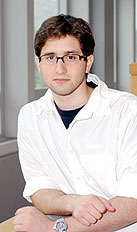Mythical fascination leads to odyssey with classical languagesBy Patricia Allen Princeton NJ -- As a 10th-grader at Collegiate High School in New York City, Jesse Liebman and a small group of his friends convinced their Latin and Greek teacher to create a class in ancient Greek. Not only did they persuade their teacher to create the class, they agreed to take the class at 7:45 in the morning, long before the official start of the school day.
An early fascination with Greek mythology as a child fueled his drive to study classical languages in high school and later, his decision to major in classics at Princeton, he said. By the time he graduated from high school, Liebman was proficient in French and Latin and had considerable reading knowledge in ancient Greek. During his freshman year, he began taking advanced third-level Latin classes and embarked on Italian classes. By his sophomore year, he already was up to third-level classes in classical Greek. But it was his study of ancient literature, particularly the Homeric poems, that became his passion while he was a student at Princeton. It led to a research trip to Greece and Turkey and influenced the topic of his senior thesis, "Hektor's Mortal Glory: Balance and Irony in the Iliad," a character study of Hektor in the Iliad. "My intellectual interests in ancient literature and mythology coalesced at the end of my sophomore year when I was taking Professor Zeitlin's course on the Odyssey, Professor Sitney's course, called 'The Idea of Greece in European Cinema,' and Professor Fagles' class on tragedy," he said. "Each of these offered complementary approaches to material I had confronted before, but never with such informed and innovative perspectives." As Liebman was finding inspiration in his professors, they, in turn, were taking notice of his zest for the intellectual life and study of classic literature. In fact, the originality and sophistication of his work made two seasoned faculty members re-consider their own scholarly analysis and interpretation of two versions of the Iliad. "I have studied and taught this great Homeric poem throughout my academic career, but Jesse has opened my eyes to concepts and nuances I had never considered before," said Professor Froma Zeitlin, the Ewing Professor of Greek Language and Literature and his adviser. Zeitlin said his senior thesis was "a combination of close textual analysis, conceptual sophistication and what seems to me an entirely original approach to the subject." Robert Kaster, the Kennedy Foundation Professor of Latin Language and Literature, said until reading Liebman's spring junior paper last year on a first-century Latin translation of the Iliad, he had always regarded the Latin translation "to be a completely unpromising text ... a Reader's-Digest-condensed-books version of a great classic." "Thanks to Jesse, I'm prepared to believe that it was the work of someone with a real point of view which made sense in its own time and place," Kaster said. He went on to say about Liebman: "Having the imagination to see promise in unpromising subject matter is not a common talent." Liebman's talents also extend outside of the scholarly arena and onto the stage. As a member of the Triangle Club, he was an actor, writer and director. He performed in three of its fall shows and one spring show, as well as in "What the Butler Saw" at 185 Nassau St. Last year, he served as the writing coordinator for Triangle and directed this year's spring show, "Schlock and Awe." He planned to perform in Triangle's show, "This Side of Parody," for Reunions weekend. While on summer break from Princeton, he pursued internships in the theater working as a directorial intern for the Broadway production of "The Lion King" and as a production assistant for the Eugene O'Neill Theater Center during the summer of 2000. Next year, he plans to work with a New York theater management company, NJNG Productions, where he was an intern last summer with responsibilities including assisting in the production, publicity and management of Broadway and off-Broadway shows. Although he is beginning his career in the theater, he has not ruled out graduate school or furthering his study of classics. "I look forward to some real-world experience before making any final decisions." |
[an error occurred while processing this directive] |
